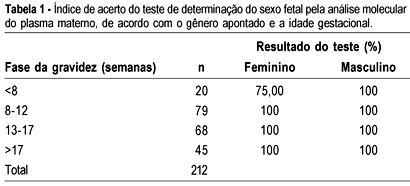PURPOSE: to evaluate a new method of fetal sex determination through the analysis of DNA from maternal plasma. METHODS: peripheral blood (10 mL) was drawn from pregnant women in different gestational ages. Plasma was separated and isolated DNA was submitted to the polymerase chain reaction (PCR) with primers from the Y-chromosome-specific gene DYS14. RESULTS: two hundred and twelve patients were enrolled. PCR results were compared to either confirmatory ultrasonography and/or birth. Agreement was observed in 209 samples. Discordant plasmas had a PCR result of female fetus and all of them were derived from mothers with less than 8 weeks of pregnancy. CONCLUSION: the PCR method developed for fetal sex determination has excellent sensitivity and specificity, permitting its use as a routine test. A PCR result of male fetus presents a higher confidence than a female one, specially in early gestational periods. New applications employing fetal DNA from maternal plasma are being developed and hopefully will allow noninvasive diagnosis of several conditions.
PCR; Plasma DNA; Fetal sex determination


